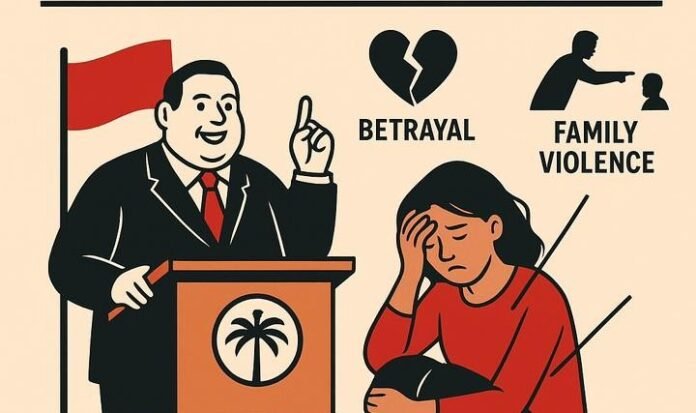By Mahmud Tim Kargbo
Patriotism has always been a contested word. In his Dictionary (1755), Samuel Johnson defined a patriot as “one whose ruling passion is the love of his country.” Yet by 1775, Johnson had added a darker meaning: “a factious disturber of the government” (http://www.samueljohnsondictionary.com). This duality captures Sierra Leone’s own dilemma. In our political discourse, patriotism is either a noble devotion to the nation or a convenient cloak for corruption and impunity.
Patriotism and the TRC’s Warning:
The Truth and Reconciliation Commission (TRC) Report, produced after Sierra Leone’s civil war, explicitly warned that patriotism had often been misused. The TRC stated: “Cynicism, impunity and corruption among Sierra Leone’s political elite have undermined public faith in the state. Leaders have invoked national unity as a justification for actions that serve narrow interests, rather than the common good” (http://www.sierraleonetrc.org).
The TRC further observed: “Public confidence in governance can only be restored when leaders demonstrate genuine service to the nation, respect for the law, and accountability in the use of public resources” (http://www.sierraleonetrc.org). These findings highlight that patriotic rhetoric alone is insufficient; it must be paired with ethical leadership and institutional integrity.
Patriotism in Party Politics:
Since independence, both the All People’s Congress (APC) and the Sierra Leone People’s Party (SLPP) have claimed patriotic legitimacy. Yet Sierra Leoneans question whether party loyalty has supplanted love of country. The 1991 Constitution guarantees in Section 15 the rights of citizens to freedom of expression, assembly and association (http://www.sierra-leone.org/Laws/constitution1991.pdf). However, governments have frequently equated patriotism with loyalty to themselves, rather than to the nation.
The protests of 10 August 2022, led largely by unemployed youth, underscored this contradiction. The government branded the demonstrations unpatriotic and subversive. Many citizens, by contrast, regarded them as acts of patriotic duty, ordinary Sierra Leoneans demanding accountability and better living conditions in defence of their constitutional rights.
Audit Evidence: Patriotism Betrayed in Practice:
The Audit Service Sierra Leone’s 2022 Report provides stark evidence of how patriotism is betrayed by those in power. It revealed:
• Le 500,962,192,350 in unsupported expenditure across ministries, departments and agencies.
• Procurement breaches amounting to Le 113,857,098,474 in contracts awarded without due process.
• Irregularities in COVID-19 funds, including Le 13,935,000,000 unaccounted for in the Ministry of Health and Sanitation.
• Over Le 4,079,085,948 in irregular payments to ghost staff across several ministries (http://www.auditservice.gov.sl).
Behind these figures lie tangible failures in communities. In Port Loko District, funds intended for school rehabilitation never reached rural schools, leaving children to learn in classrooms without furniture or proper roofs. In Kenema, maternal health centres were understocked with essential drugs due to mismanaged allocations. In Bombali, feeder roads remained unpaved, cutting farmers off from markets during the rainy season.
As the TRC warned: “When public resources are misappropriated, patriotism is hollowed out, and citizens are deprived of the very benefits that justify their loyalty and sacrifice” (http://www.sierraleonetrc.org).
Public Perception of Patriotism and Corruption:
Afrobarometer’s 2022 survey underscores this crisis of trust. It found that:
• 80% of Sierra Leoneans believe corruption in government is widespread.
• 72% say leaders use power for personal gain rather than for the people.
• Only 22% trust parliament to hold the executive accountable.
• A majority believe “leaders demand loyalty to party before service to country” (http://www.afrobarometer.org).
These findings explain why patriotic appeals by politicians often fall on deaf ears. Citizens perceive that leaders demand sacrifices in the name of patriotism while betraying it through corruption and neglect.
Constitutional Lessons:
The Supreme Court case Sam-Sumana v. Attorney-General (2015) remains a critical episode. The Court upheld President Ernest Bai Koroma’s dismissal of Vice-President Sam-Sumana without parliamentary impeachment, a move many legal scholars argued violated Sections 50 and 51 of the Constitution (http://www.sierralii.org). Such rulings erode patriotism by reinforcing the belief that constitutional safeguards protect politicians rather than citizens.
The TRC was explicit: “True patriotism must be anchored in accountability, respect for the rule of law, and civic values that transcend partisan boundaries” (http://www.sierraleonetrc.org).
A Civic Patriotism:
Sierra Leone’s history offers alternative models of authentic patriotism. Bai Bureh, in resisting the Hut Tax War of 1898, defended collective sovereignty, not partisan power. Amadu Wurie’s legacy in education was not tied to a political party but to the development of civic-minded youth. Both exemplify a patriotism rooted in sacrifice and service, not in slogans.
In Sierra Leone today, patriotism remains unsettled. For those in power, it is too often a demand for obedience. For citizens, it is increasingly a call for justice. Audit reports expose the betrayal of national resources. Afrobarometer data reveal the depth of public distrust. The Constitution promises freedoms that are too often denied.
If patriotism is to mean more than Samuel Johnson’s “last refuge of scoundrels,” Sierra Leone must cultivate a civic patriotism, one grounded in transparency, accountability, and fidelity to the Constitution. Until then, the question “patriotism for whom?” will remain painfully relevant, dividing rulers and ruled, and exposing the dangerous gap between the nation we aspire to and the governance we endure.








